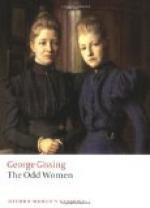The knock above was repeated. Yes, this time there could be no mistake; it was on this side of the landing—that is to say, at her lover’s door. But the door did not open; thus, without going up herself, she received assurance that Bevis was not at home. He might come later. She still had an hour or two to spare. So, as if disappointed in a call at Mr. Barfoot’s, she descended the stairs and issued into the street.
Agitation had exhausted her, and a dazzling of her eyes threatened a recurrence of yesterday’s faintness. She found a shop where refreshments were sold, and sat for half an hour over a cup of tea, trying to amuse herself with illustrated papers. The mechanic who had knocked at Bevis’s door passed once or twice along the pavement, and, as long as she remained here, kept the shop within sight.
At length she asked for writing materials, and penned a few lines. In on her second attempt she failed to see Bevis, she would drop this note into his letter-box. It acquainted him with the address to which he might direct letters, assured him passionately of her love, and implored him to be true to her, to send for her as soon as circumstances made it possible.
Self-torment of every kind was natural to her position. Though the relief of escaping from several distinct dangers had put her mind comparatively at ease for a short time, she had now begun to suffer a fresh uneasiness with reference to the young and handsome woman who came downstairs. The fact that no one answered the workman’s knock had seemed to her a sufficient proof that Bevis was not at home, and that the stranger must have come forth from the flat opposite his. But she recollected the incident which had so alarmingly disturbed her and her lover yesterday. Bevis did not then go to the door, and suppose—oh, it was folly! But suppose that woman had been with him; suppose he did not care to open to a visitor whose signal sounded only a minute or two after that person’s departure?
Had she not anguish enough to endure without the addition of frantic jealousy? She would not give another thought to such absurd suggestions. The woman had of course come from the dwelling opposite. Yet why might she not have been in Bevis’s flat when he himself was absent? Suppose her an intimate to whom he had entrusted a latch-key. If any such connection existed, might it not help to explain Bevis’s half-heartedness?
To think thus was courting madness. Unable to sit still any longer, Monica left the shop, and strayed for some ten minutes about the neighbouring streets, drawing nearer and nearer to her goal. Finally she entered the building and went upstairs. On this occasion no one met her, and no one entered in her rear. She knocked at her lover’s door, and stood longing, praying, that it might open. But it did not. Tears started to her eyes; she uttered a moan of bitterest disappointment, and slipped the envelope she was carrying into the letter-box.




